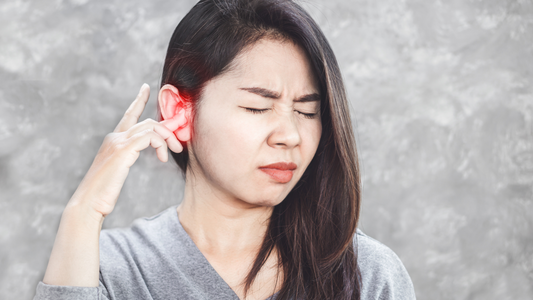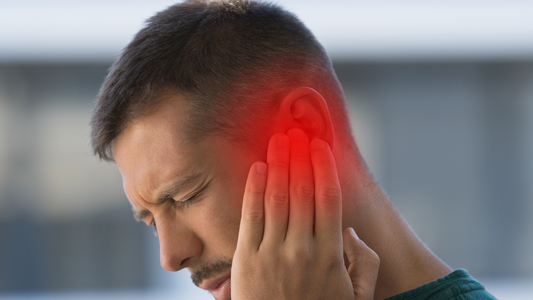Remember the last time you tried to listen to your grandkid's story, but all you heard was a strange buzzing? You're not alone; hearing troubles can be a real bother as we get older. Sometimes, the fix can be as straightforward as sorting out our earwax. This little thing may seem small, but did you know too much of it might lead to an annoying ring or buzz in your ears called tinnitus?
Let's chat about what happens when our ears don't clean out earwax right and how it can mess with our hearing. No need for fancy words – we'll keep it simple and get to the bottom of why your ears might be giving you a hard time. Ready to tune back in to life's beautiful sounds? Keep reading; we're about to dive into the nitty-gritty of keeping your ears happy and healthy!
Understanding Tinnitus for Seniors
Have you ever been in a perfectly silent room, just to hear a faint whistle out of the blue? No one else can hear it, and you can't find where it's coming from. This nuisance, maybe a whistle or a slight buzz, is something quite a few adults—particularly older ones—might recognize. It's called tinnitus. It's when you hear sounds without any noise from the world causing them. Some might hear a sound like a hissing whisper, while others deal with a constant, aggravating ring. The loudness and type of noise can vary wildly. If you've heard something along these lines, know that a lot of people have had a similar ordeal. Even though it's common, tinnitus isn't a disease by itself. More likely, it's pointing to something else going on, such as too much earwax or hearing loss that tends to happen as we age.
How Do We Hear?
Hearing—it's something we might take for granted, but have you stopped to think about how it works? Say a friend is talking with you. Their words travel through the air, get caught by your outer ear—that part everyone sees—and they travel down into your middle ear. There, tiny bones move in response. It's quite the intricate dance these little bones do, precision at its finest. From there, the sound moves into your inner ear, reaching the cochlea, which is this snail-shaped tube. The cochlea's lined with hairs that tremble and convert vibrations into something the brain can make sense of. It's like the sound waves have come to the end of their path when you finally hear and understand what's being said. But, if something blocks this process, like too much earwax, things can go haywire, and instead of your friend's tale about their morning, you're stuck with an aggravating ringing in your ears.
How Does Impacted Ear Wax Cause Tinnitus?
Are you ever at a gathering and suddenly, it feels like your hearing is covered in a blanket? That's odd. It could be ear wax clogging your ears. Our ears often do the job of cleaning themselves, though at times they can't quite keep up. When wax gets packed in, it's like it puts up a wall against sound to your inner ear. If your ears can't catch the whole scene, they might go a bit haywire. That's when you might start hearing a ringing or buzzing that's not actually there, known as tinnitus. It could be that taking care of that packed wax brings back the crystal-clear sounds around you, minus the unwelcome noise.
How to Remove Ear Wax at Home

So, your ear feels blocked and you're pretty sure wax is to blame. You've heard you can clear out ear wax yourself, but what's the best way to do it? One thing's for sure: don't use cotton swabs. They're likely to push the wax further in. A few drops of room-temperature olive oil or commercial ear drops could do the trick, softening the wax that's causing the trouble.
Simple Steps With Ear Drops or Oils
Fill a dropper with the oil or drops, and gently, without digging around, let a few drops fall into your ear. Sit still for a short spell to let the drops sink in. Eventually, let gravity do its job and tilt your head so the oil and wax can drip out onto a cloth. Repeat for a few nights and see how it goes.
Gentle Irrigation Method
If drops aren't doing enough, warm water might. It's straightforward: fill a syringe (no needles, obviously) with body-temperature water and gently squirt it into your ear canal. It's like watering a garden, you don't blast it, just a gentle stream while tilted over a sink. You could start to notice that the wax begins to move. Maybe the next song on the radio sounds clearer. But if things don't improve, don't hesitate to see a healthcare professional. It's always ok to seek extra help.
Conclusion
If your hearing isn't what it used to be and you've got that persistent ringing, earwax could be the culprit. Sometimes, the answer is as straightforward as earwax removal. It's surprising how a bit of cleaning can make a world of difference. You might be missing out on your favorite sounds, from a chat with an old friend to the chirping of morning birds, all because of earwax buildup. If that's the case, you might just find relief with a simple home remedy.
Avoid prodding in your ears with anything pointy or cotton swabs. Sometimes, a drop of mineral oil or a gentle rinse with warm water is all you need. But if things don't improve, it's smart to visit your healthcare provider. They are equipped to handle these common issues and will ensure your ears get the best care.
We’ve all been there, a little hesitant about trying something like earwax removal at home. I get it. But keeping those ears clear could mean no more irritating buzz or hum interfering with your day-to-day peace. So consider giving these methods a shot, and always err on the side of caution. Your clear-hearing days might be just a simple step away.
Wrapping It Up: Clear Ears, Better Hearing
Ever miss hearing the full story because of that annoying buzz in your ears? Getting rid of earwax might just be the trick to bring back the clear tunes of life. It's like finding that lost remote; suddenly, everything is in reach again. Keep it simple with a few drops of oil or some warm water to wave goodbye to that earwax. Remember, prodding around with swabs is a no-no! Like planting seeds in a garden, be gentle with your ears.
And hey, if you've tried the home tricks and still find yourself asking folks to repeat themselves, it could be time to chat with a doctor. They might have just the solution. If you're really struggling, our team at HearWell Group is here to help with a hearing aid that could be a game changer. Laughter, music, those heartwarming stories from the grandkids—don't let them fade. A clear ear today could mean a world of rich sounds tomorrow.
Sources & References
- Baguley, D., McFerran, D., & Hall, D. (2013). Tinnitus. The Lancet, 382(9904), 1600-1607. https://doi.org/10.1016/S0140-6736(13)60142-7
- Langguth, B., Kreuzer, P. M., Kleinjung, T., & De Ridder, D. (2013). Tinnitus: causes and clinical management. The Lancet Neurology, 12(9), 920-930. https://www.thelancet.com/journals/laneur/article/PIIS1474-4422(13)70160-1/fulltext
- Piccirillo, J. F., Rodebaugh, T. L., & Lenze, E. J. (2020). Tinnitus. JAMA, 323(15), 1497-1498. https://jamanetwork.com/journals/jama/article-abstract/2763317
- Nondahl, D. M., Cruickshanks, K. J., Wiley, T. L., Klein, R., Klein, B. E., & Tweed, T. S. (2002). Prevalence and 5-year incidence of tinnitus among older adults: the epidemiology of hearing loss study. Journal of the American Academy of Audiology, 13(6), 323-331. https://www.thieme-connect.com/products/ejournals/abstract/10.3766/jaaa.13.6.3

The Hear Well Group Research Team: Trusted Hearing Health Insights
Our experienced research team compiles hearing health data from credible, peer-reviewed sources and presents it in easy-to-understand terminology. We ensure accuracy and trustworthiness, providing up-to-date, evidence-based recommendations to enhance hearing care practices and inform our readers' hearing well-being decisions.


